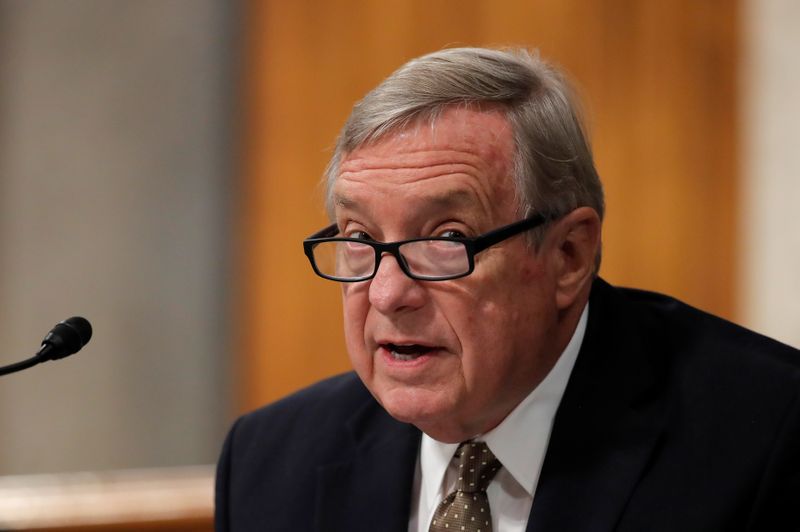By Richard Cowan and Jeff Mason
WASHINGTON/BEDMINSTER, N.J. (Reuters) - U.S. President Donald Trump vowed to unilaterally suspend payroll taxes and extend expired coronavirus unemployment benefits after negotiations with congressional Democrats on a broad pandemic aid package collapsed on Friday.
Trump told a news conference at his golf club in New Jersey that he will sign an executive order implementing these measures, suspending student loan repayments and rental housing evictions in coming days if no deal is reached.
He said the payroll tax suspension -- a move he has long called for but shunned by both parties in Congress -- would be retroactive to July 1 and extend through the end of 2020, with a possible extension into next year if he is re-elected.
Trump said the order could be signed by the end of the week, without specifying whether he meant this week or next week. He added that he expected it to be challenged in court.
"If Democrats continue to hold this critical relief hostage, I will act under my authority as president to get Americans the relief they need," Trump said at the briefing, which took on the look of a campaign event.
NO PROGRESS
Earlier on Friday in Washington, Trump's chief of staff, Mark Meadows, and Treasury Secretary Steven Mnuchin said there was no progress in negotiations at the Capitol with the two top Democrats in Congress, House Speaker Nancy Pelosi and Senate Democratic leader Chuck Schumer.
The global pandemic has taken a particularly heavy toll on the United States, where it has killed more than 160,000 people and thrown tens of millions out of work. Trump initially played down the disease's threat and has drawn criticism for inconsistent messages on public health steps such as social distancing and masks.
Friday's talks appeared to mark the end of nearly two weeks of almost daily closed-door negotiations between the four leaders, who have sought to hammer out an agreement on legislation to resume COVID-19 relief programs that expired at the end of July.
Democrats said they offered to reduce a proposed $3.4 trillion coronavirus aid package, which the House passed in May but the Senate ignored, by nearly one-third if Republicans would agree to more than double their $1 trillion counter-offer.
Trump's negotiators turned them down.
"It was a disappointing meeting," Schumer told reporters.
Both sides said they remained open to further negotiations.
"I will be back here any time to listen to new proposals," said Mnuchin, who identified the roadblocks as funding for state and local governments and an extension of enhanced unemployment payments, a $600 per week lifeline for those who have lost jobs in the coronavirus crisis.
Pelosi said she gave him and Meadows a stern parting message: "Come back when you're ready to give us a higher number."
EXECUTIVE POWER LIMITS
It was unclear how much any president could do by executive order. At his news conference, Schumer said the president could not order any new money spent - as that is the power of Congress - but could only defer costs until they were eventually paid.
The U.S. Constitution gives Congress authority over federal spending, so Trump does not have the legal authority to issue executive orders determining how money should be spent on the coronavirus.
Trump has managed to sidestep Congress on spending before. In 2019, he declared a national emergency on the U.S.-Mexico border to shift billions of dollars from the defense budget to pay for a border wall he promised during his 2016 election campaign.
Schumer placed some of the blame for the lack of progress on 20 Republicans in the Senate greatly influenced by the conservative Tea Party: "They don't want to spend the necessary dollars to help get America out of this mess. Ideology sort of blinds them."
Pelosi said Democrats want the biggest possible number for reviving the expired enhanced unemployment payments. Renewing that benefit has been a leading Democratic demand.
The White House at one point suggested $400 a week in federal benefits for the unemployed, but Democrats rejected it and have refused to do a separate deal, saying they wanted a comprehensive package that also included money for state and local governments and other matters.

More than 300 U.S. mayors this week sent a letter to Trump requesting $250 billion in direct federal aid to cities across the country. U.S. state governors of both parties have asked Congress for another $500 billion.